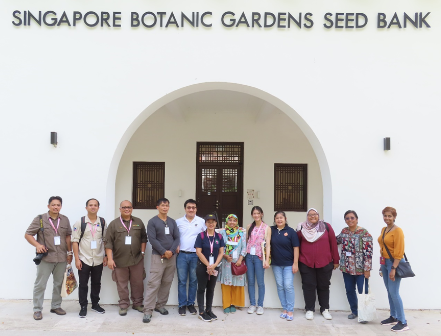Exceptional Species Micropropagation and Cryopreservation Workshop 2022
-
Country
Singapore -
Region
Asia -
Programme
Southeast Asia Botanic Garden Network -
Workstream
Sharing Knowledge and Resources -
Topic
Year in review 2022 -
Type
News -
Source
BGCI
News published: 02 December 2022
Southeast Asia Botanic Gardens (SEABG) Network: Exceptional Species Micropropagation and Cryopreservation Workshop 2022
Plant species classified as ‘exceptional’ are species that cannot be effectively conserved through conventional seed banking conditions (Pence et al, 2022). The tropical rainforest of Southeast Asia is home for to many exceptional species where effective conservation becomes a challenge requiring specific range of skills and technologies.
In November 2022, a training workshop on conserving exceptional species was held at Singapore Botanic Gardens (SBG) to build capacity of researchers and conservation officers working in Southeast Asia, who are mainly involved in preserving exceptional species. The 3 days in person workshop, jointly organised by Botanic Garden Conservation International (BGCI) and Singapore Botanic Gardens (SBG), explored the feasibility of micropropagation and cryopreservation procedures as a complementary alternative ex situ conservation method. The exceptional species workshop had representative attending from Philippines, Indonesia, Malaysia, Singapore, Australia, New Zealand and USA as participants and trainers.
Participants of the workshop were introduced to fundamental laboratory skills used to micropropagate and preserve the exceptional species under aseptic in vitro conditions. Participants also learnt on setting up a functional facility at their institution in a cost-effective manner. The in vitro propagation and regeneration of plant propagules, can support the existing conservation efforts of threatened plant species. One such example is the mass flowering of dipterocarps forests. Dipterocarps mostly produce tonnes of seeds during masting, occurring at intervals of 3 to 10 years where the recalcitrant seeds must germinate within a few days before losing its viability. During the mass flowering, germinating or conserving the dipterocarp embryos in vitro could reduce the space constraints in the nurseries and support future reforestation efforts.
The workshop concluded acknowledging the need to identify gaps in conserving exceptional species of Southeast Asia to prevent further loss of highly threatened taxa. To better understand the exceptional species, identify the conservation challenges, a recommendation to consolidate the network of expertise on exceptional species in the region was put forward. The botanic gardens in Southeast Asia would be the driving force that develops a dedicated regional chapter for Exceptional Species.
(Conservation officers and researchers who are interested to join the network please contact greetha.arumugam@bgci.org, SEABG Network Manager, BGCI Southeast Asia).

Become a Member
Be part of the largest network of botanic gardens and plant conservation experts in the world by joining BGCI today!
Support BGCI
You can support our plant conservation efforts by sponsoring membership for small botanic gardens, contributing to the Global Botanic Garden Fund, and more!